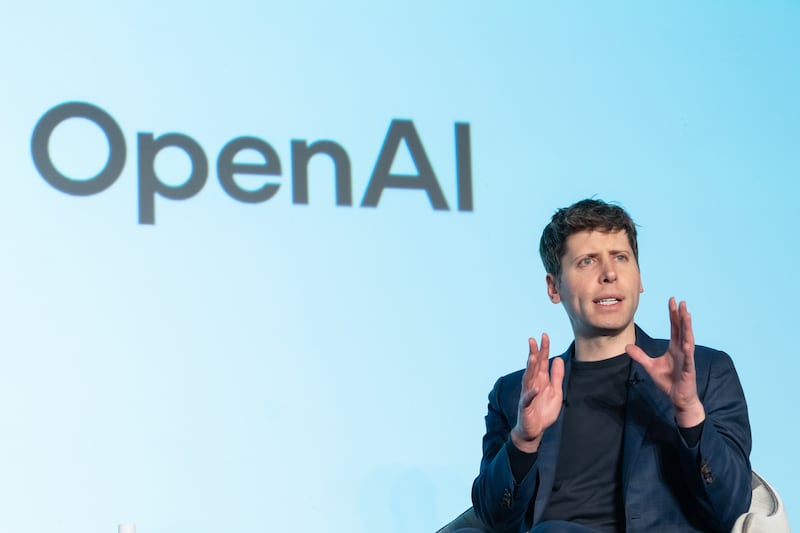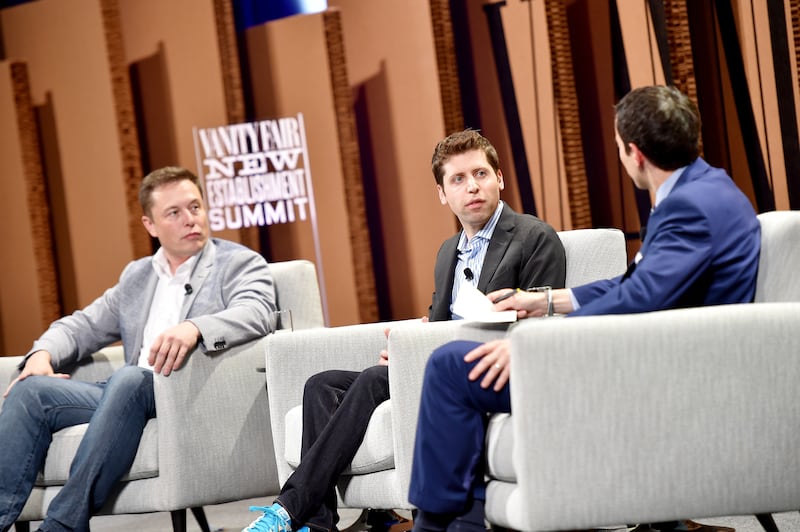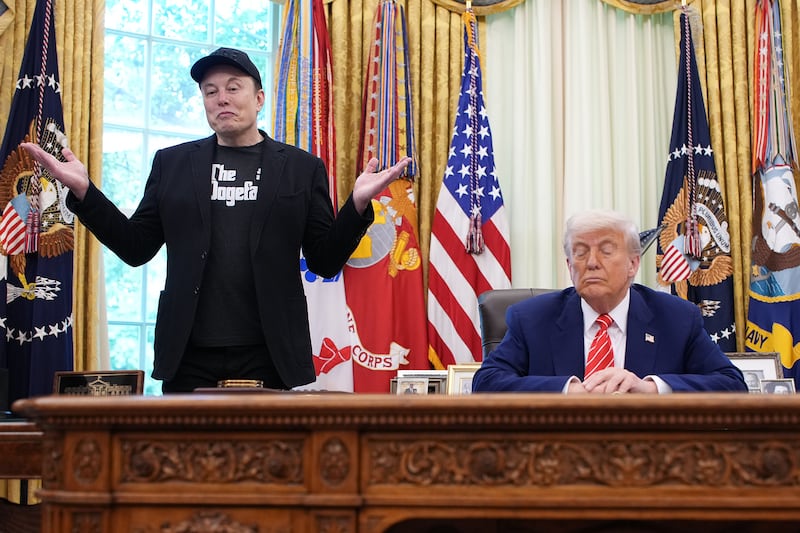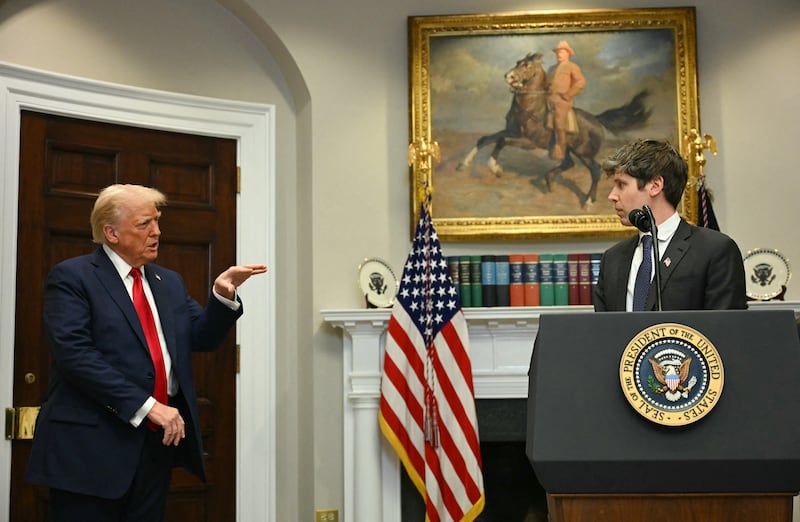Elon Musk’s most dire nemesis has fought a quiet battle to capitalize on his break-up with President Donald Trump and supplant him as the commander in chief’s number-one tech billionaire buddy.
A new Wall Street Journal report describes how Sam Altman, the CEO of ChatGPT-creator OpenAI, has charted a path into Trump’s good graces despite Musk’s fierce opposition.
After the blow-up between Musk and Trump last month, Altman seems perfectly poised to take his rival’s spot at the president’s side.
Altman, 40, a prolific start-up investor and AI innovator, was once a close ally to Musk, 54—the two were both co-founders of OpenAI, but the pair fell out over differing opinions about how the company should be run. Musk left the firm’s board in 2018.
Historically, Altman has been a dedicated Democrat—in 2016, he endorsed Hillary Clinton and said that Trump would be “a disaster for the American economy.”

However, according to the Journal, Altman gradually became concerned with the Democrats’ approach to economic policy. He took issue with Joe Biden’s COVID-era stimulation checks, warning of inflation and its effect on the deficit.
He was also disheartened by Biden’s stance on AI, feeling that the $50 billion the then-president’s administration pushed into American microchip production was not nearly enough, the Journal reported.
Even before Trump and Musk’s partnership formed, Altman was already laying the groundwork to align himself with the man who would become the next president.
OpenAI began making overtures to Trump’s camp in spring 2024, as part of an effort to build a relationship with both of the political parties. The company appealed to Trump’s appreciation for “winners” by painting themselves as leader in AI—and it worked.

On the campaign trail, Trump often emphasized his willingness to support AI innovation. In an interview on Logan Paul’s podcast in June 2024, he called the AI a “superpower” and saying that the U.S. needed to “take the lead over China”
The latter point echoed a message that OpenAI and Altman had imparted to Trump during a meeting in Las Vegas just days earlier.
While Altman would have made strong AI ally for Trump when he won the election, that possibility was thwarted by the fact that Musk had emerged as Trump’s top backer and an influential adviser.
He had his own AI company, xAI, and a Trumpian nickname for Altman: “Swindly Sam,” according to the Journal.

Unlike other tech bigwigs, Altman was unable to secure a meeting with Trump at Mar-a-Lago after the election. And despite donating $1 million to Trump’s inauguration, Altman was sidelined—he got into the event but was left off the stage, where the likes of Mark Zuckerberg, Jeff Bezos, and Musk sat.
In order to break into Trump’s circles, Altman and OpenAI hired Chris LaCivita, a Trump campaign aide, and Jeff Miller, a well-connected MAGA lobbyist.
The move paid off, as Altman in January earned an invite to the Oval Office, where he stood alongside Trump for the announcement of a $500 billion AI project. The partnership between OpenAI, Oracle, and Japan’s SoftBank was called Stargate.
Blindsided, Musk became enraged, firing off a string of X posts attacking the deal, which prompted Altman to hit back. Musk then made things personal, posting an old tweet of Altman’s in which he criticized Trump.
In response, Altman wrote that his views had changed over time, saying, “I wish I had done more of my own thinking.“ He added that he was ”not going to agree with him on everything, but I think he will be incredible for the country in many ways!”
The dispute did not go unnoticed by Trump, who took a jab at Musk when asked by a reporter about the DOGE chief’s criticism of the Stargate deal.
“He hates one of the people in the deal,” Trump said. “People in the deal are very, very smart people, but Elon—one of the people he happens to hate. But I have certain hatreds of people, too.”
Despite Musk’s anger, Trump continued to work with Altman. The two were supposed to team up for next stage in Starship: the announcement of a massive new data center in Abu Dhabi in partnership with G42, a United Arab Emirates AI firm.
When Musk heard that Altman would appear alongside Trump for the announcement, he began to harass the president’s aides and contacts at G42 with complaints, the Journal reported. Trump was even pulled out of a meeting to discuss the situation.

To avoid Musk’s rage, G42 delayed the announcement—even though journalists had already been briefed—until Trump’s Middle East tour was over.
In June, tensions that had long been boiling between Trump and Musk burst into the public eye, first as criticism of the president’s “Big Beautiful” bill before transforming into an explosive exchange of personal attacks. Musk went as far as to accuse Trump in being in the government’s Jeffrey Epstein files.
Altman, meanwhile, has continued to get cozier with the administration. OpenAI struck a new $200 million contract with the Pentagon in June, and Altman will be the keynote speaker at an upcoming Federal Reserve conference.
While Altman is not yet ready to call himself a Republican, insiders told the Journal that he could see himself voting red in the next election.
OpenAI, the White House, and Musk via his lawyer did not immediately return the Daily Beast’s requests for comment.






